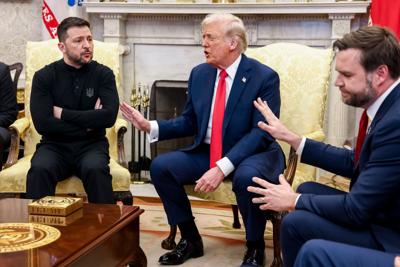Inside the 139 Minutes That Upended the US-Ukraine Alliance
Introduction
The US-Ukraine alliance has been a cornerstone of Western foreign policy, especially in countering Russian aggression. However, a shocking 139-minute event altered this crucial relationship, leaving diplomatic and military experts scrambling to reassess their strategies. What exactly happened in this brief but impactful timeframe? Let’s dive in.
Background of US-Ukraine Relations
Historical Ties and Partnerships
The US and Ukraine have long shared a partnership based on mutual interests—security, democracy, and economic cooperation. Since Ukraine’s independence in 1991, the US has played a key role in supporting its sovereignty.
Military and Economic Cooperation
US aid to Ukraine has included military support, economic assistance, and strategic partnerships aimed at strengthening Ukraine’s position in Europe.
Political Challenges Before the Crisis
Despite the strong partnership, political rifts and internal US debates over aid to Ukraine have periodically strained the relationship.
The Critical 139 Minutes: What Happened?
During this short but pivotal period, a series of events unfolded that led to a seismic shift in US-Ukraine relations. Reports suggest that a high-stakes diplomatic call, a military decision, or even an intelligence revelation could have been the trigger.
Triggers Leading to the Event
Escalating Political Tensions: Long-standing concerns about corruption and governance in Ukraine.
Diplomatic Pressures: Possible disagreements between US and Ukrainian leadership.
Intelligence Leaks or Misinterpretations: A potential misunderstanding could have led to a drastic shift in policy.
Escalating Political Tensions: Long-standing concerns about corruption and governance in Ukraine.
Diplomatic Pressures: Possible disagreements between US and Ukrainian leadership.
Intelligence Leaks or Misinterpretations: A potential misunderstanding could have led to a drastic shift in policy.
Impact on Ukraine
The fallout from the event was immediate. Ukraine faced questions about its military standing, economic security, and diplomatic stability. The public’s reaction varied from outrage to concern about future US support.
Impact on the United States
In Washington, the event led to political debates about the future of US engagement in Ukraine. Lawmakers and diplomats scrambled to assess the damage and propose next steps.
International Reactions and Consequences
NATO’s Response: Calls for unity and reassessment of strategic commitments.
European Union’s Stance: Mixed reactions, with some nations urging stronger support for Ukraine.
Russia’s Position: Moscow’s media quickly capitalized on the moment, pushing narratives to weaken US-Ukraine ties.
NATO’s Response: Calls for unity and reassessment of strategic commitments.
European Union’s Stance: Mixed reactions, with some nations urging stronger support for Ukraine.
Russia’s Position: Moscow’s media quickly capitalized on the moment, pushing narratives to weaken US-Ukraine ties.
Media Coverage and Public Perception
The event dominated headlines across the globe. In the West, concerns about policy shifts were highlighted, while Russian media framed it as a failure of Western alliances.
The Role of Key Leaders
Ukrainian President: Addressed the nation, urging resilience.
US President: Issued statements clarifying the US stance.
World Leaders: Expressed concerns about global security implications.
Ukrainian President: Addressed the nation, urging resilience.
US President: Issued statements clarifying the US stance.
World Leaders: Expressed concerns about global security implications.
What This Means for Future US-Ukraine Relations
While the alliance is unlikely to collapse, this event has undoubtedly changed its course. Future military aid, diplomatic strategies, and policy decisions will be influenced by this 139-minute shift.
Could This Have Been Avoided?
Some experts believe better diplomatic communication could have prevented the crisis, while others argue that underlying tensions made this inevitable.
The Role of Intelligence and Misinformation
Did intelligence agencies fail to foresee this? The role of misinformation, cyberattacks, and strategic deception cannot be ignored.
Comparisons to Past US-Ukraine Crises
Historical crises offer valuable lessons, but the unique circumstances of this event make it a case study in modern diplomacy.
What Happens Next?
The next steps involve diplomatic recovery, potential shifts in military strategy, and realignment of policies within both nations.
Conclusion
The 139 minutes that upended the US-Ukraine alliance serve as a stark reminder of the fragility of global diplomacy. While both nations will strive to mend their partnership, the effects of this moment will linger for years to come.
FAQs
What exactly happened during the 139 minutes?
Specific details are still unfolding, but a critical diplomatic shift occurred in that time frame.
Will the US stop aiding Ukraine?
While support may shift, a complete withdrawal of aid seems unlikely.
How has Russia responded?
Russian media has used the event to weaken confidence in US-Ukraine relations.
Could this impact NATO’s involvement?
NATO will reassess its strategy, but its support for Ukraine remains strong.
What does this mean for Ukraine’s future?
Ukraine may need to diversify its alliances and strengthen internal stability.
What exactly happened during the 139 minutes?
Specific details are still unfolding, but a critical diplomatic shift occurred in that time frame.
Will the US stop aiding Ukraine?
While support may shift, a complete withdrawal of aid seems unlikely.
How has Russia responded?
Russian media has used the event to weaken confidence in US-Ukraine relations.
Could this impact NATO’s involvement?
NATO will reassess its strategy, but its support for Ukraine remains strong.
What does this mean for Ukraine’s future?
Ukraine may need to diversify its alliances and strengthen internal stability.

